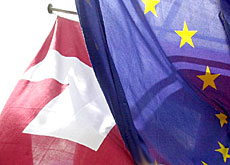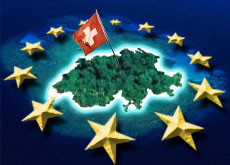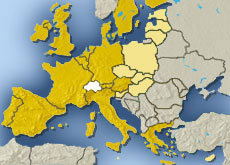Swiss view EU enlargement with mixed feelings

Swiss citizens are uncertain about Switzerland’s position outside the European Union as it expands to include ten new members on May 1.
While many believe their country can still go it alone, others fear being left out in the cold.
In 1992 the Swiss voted against joining the then European Economic Area, which would have been a first step towards full EU membership.
Since then the Swiss government has negotiated a series of bilateral agreements with Brussels, aimed at giving Switzerland access to some of the benefits of the EU without actually joining it.
Several thorny issues are still outstanding however, including the question of taxation and the free movement of labour.
Too busy
But negotiations so far have been long and painstaking, and some analysts believe Brussels may be too busy with the ten new members to take time to continue dealing with Switzerland separately.
“I think the EU will be very preoccupied with the new member countries,” said Karin Gilland Lutz of Bern University’s Political Institute. “There will be a lot less time… to spend on Switzerland.”
Gilland Lutz’s students meanwhile worry that Switzerland’s continued isolation from the EU will deny them a voice in Europe’s future.
No voice
“What really bothers me is that at this crucial moment when Europe is expanding we cannot participate,” said Mike Bucher. “We don’t have the chance to shape the EU as it grows.”
His fellow student Elisa Gilgen doesn’t believe Switzerland’s position outside the EU is a sustainable one.
“I think we will have to join sooner or later,” she said. “So it’s better to join now so we can have a say in things.”
One of Gilgen’s concerns is that Switzerland’s deals with the EU – such as a bilateral agreement giving young Swiss the right to work in EU countries – are often difficult to put into practice.
“In theory we have the same rights as EU citizens,” she said. “But in practice it’s pretty complicated – there seems to be a lot of bureaucracy involved.”
Business fears
The concern that EU countries will be put off by the bureaucracy of dealing with Switzerland is shared by many small Swiss businesses.
Michael Dürst runs a small information technology company in Zurich, and he has already had experience trying to do business with EU countries. “It can be very difficult,” he admitted.
“I had prospective clients who were ready to work with us, until they saw all the paperwork involved.
“In the end they decided it was all too complicated, and they [picked] a company from an EU member state instead. As far as I am concerned, it would be much easier if we simply joined the EU.”
Farmers’ doubts
One sector where opposition to Swiss membership of the EU remains very strong, however, is agriculture.
Swiss farmers, who traditionally have small, labour-intensive farms – and consequently higher prices for their products – fear having to compete with the vast agro-industries of Germany, France and the Netherlands.
“I see absolutely no advantage for us farmers in joining the EU,” said Werner Salzmann, who has a dairy farm in canton Bern.
“I’ve heard that our income would be halved if we joined. Things are already difficult enough for our farmers.”
Salzmann also believes the structure of the EU makes it an overly bureaucratic and undemocratic organisation. “We don’t know who makes the decisions in Brussels,” he complained. “To me it looks like a dictatorship.”
Island
But just about everyone, including Salzmann, believes that Swiss membership is inevitable in the long term.
“I am convinced we will have to join,” said Bern student Mike Bucher. “There is no way we can live like an island in the middle of Europe, sooner or later it will just get too stupid for everyone.”
But Gilland Lutz warns that it will be up to Switzerland to make the first move.
“Switzerland is geographically surrounded by the EU. And in terms of trade it is highly dependent on the EU,” she explained.
“In fact Switzerland needs the EU much more than the other way around.”
swissinfo, Imogen Foulkes
Opinion polls show the Swiss are deeply divided over whether EU membership would be advantageous; however most agree it is inevitable in the long term.
Political analysts doubt the EU will remain as committed to negotiating bilateral agreements with Switzerland, once Brussels has ten new member states to deal with on May 1.
In a nationwide vote in 2001, less than 24 per cent of the electorate supported a proposal to start negotiations on joining the EU.
The Swiss also voted against joining the European Economic Area – a first step to EU membership – in 1992.
60% of Swiss exports go to the EU, 80% of Swiss imports come from there.

In compliance with the JTI standards
More: SWI swissinfo.ch certified by the Journalism Trust Initiative


You can find an overview of ongoing debates with our journalists here. Please join us!
If you want to start a conversation about a topic raised in this article or want to report factual errors, email us at english@swissinfo.ch.